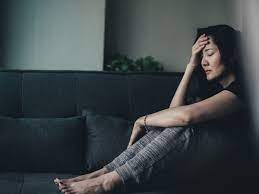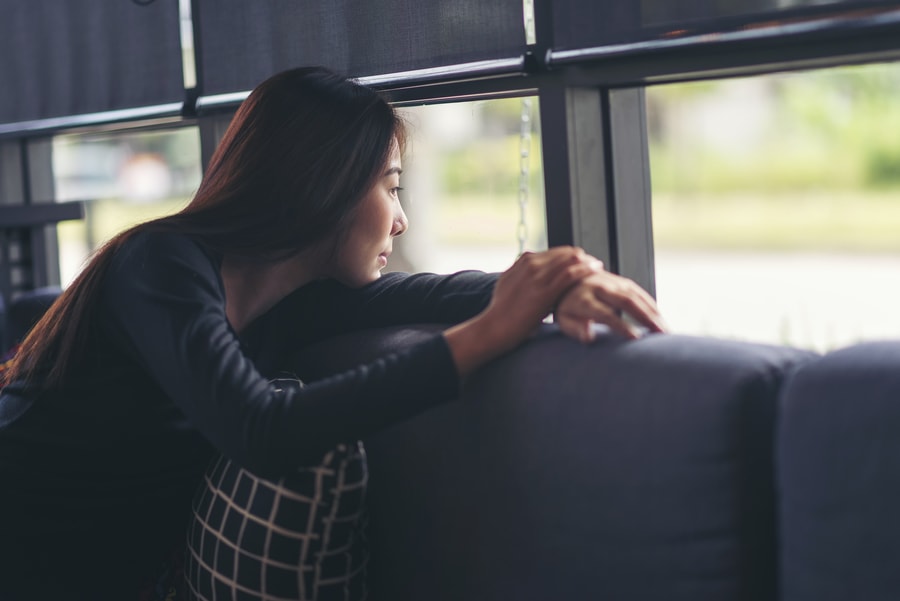Depression is a mental illness that affects millions of people all over the world. While there are many different types of depression, atypical depression is one of the most common. In this blog post, we will discuss the symptoms, treatment, and more for atypical depression. If you or someone you know is struggling with this type of depression, it is important to get help!
Contents
Understanding Atypical Depression
 Atypical depression is basically another form of clinical depression. The main difference between atypical depression and other forms of depression is that atypical depression is characterized by “mood reactivity”. That means your mood improves in response to positive events. And “positive affect” (an overall sense of well-being even during periods of low mood).
Atypical depression is basically another form of clinical depression. The main difference between atypical depression and other forms of depression is that atypical depression is characterized by “mood reactivity”. That means your mood improves in response to positive events. And “positive affect” (an overall sense of well-being even during periods of low mood).
This is more common in women than men. And it’s also more common in younger adults than older adults. The condition often starts in adolescence or young adulthood. Researchers have studied that atypical depression is different from other types of depression in a number of ways.
However, the most important thing to remember is that atypical depression is a serious condition that needs treatment. If you think you might have atypical depression, see your doctor or mental health professional.
More often, this type of depression is becoming recognized as a separate condition. And it’s being treated differently than other types of depression. Researchers have found that this condition responds better to certain types of treatment than others. So, consider taking treatment if the condition is causing you problems.
Symptoms
The symptoms of atypical depression are pretty similar to the symptoms of other forms of clinical depression. But there are a few key differences. People with atypical depression tend to:
- Have a hard time sleeping
- Overeat or have increased appetite
- Gain weight
- Be oversensitive to rejection
- Be irritable or agitated
- Have heavy, “leaden” limbs
These symptoms usually last for at least two weeks. And they can make it hard for you to function in your day-to-day life. Moreover, the signs and symptoms of this condition may vary depending on how long you’ve had the condition.
For example, people who have had atypical depression for a long time may also:
- Have trouble concentrating
- Feel hopeless or helpless
- Lose interest in things they once enjoyed
- Experience fatigue or low energy
- Be forgetful
- Have aches and pains that don’t have a physical cause
- Think about death or suicide
If you’re experiencing any of these serious symptoms, it’s important to seek help from a mental health professional. They can help you develop a treatment plan for you.
Causes
 The causes of atypical depression are not currently known. However, it is believed that a combination of genetic and environmental factors may play a role in its development.
The causes of atypical depression are not currently known. However, it is believed that a combination of genetic and environmental factors may play a role in its development.
And, there could be a link between atypical depression and other mental health disorders. There are a number of risk factors that have been associated with this condition. These include:
- Having a family member with any depressive disorder or another mental health disorder
- Experiencing trauma or abuse
- Going through a major life event, such as the death of a loved one
- Having another medical condition, such as diabetes or thyroid problems
It’s important to remember that not everyone who experiences these risk factors will develop atypical depression. And, not everyone who has atypical depression will have experienced these risk factors. So, it is somehow complicated.
And therefore, the right diagnosis comes extremely important. Because it can make all the difference in terms of treatment.
Diagnosis
A diagnosis plays a vital role in understanding and treating atypical depression. Many people with atypical depression don’t seek help. Because they think their symptoms are just a normal part of life. But diagnosis and treatment can help.
The diagnosis is done by a professional. Who will ask you about your symptoms and how long you’ve had them. This professional can be:
- Psychiatrist.
- Primary care doctor.
- Mental health counselor.
A mental health professional uses methods. Such as the Diagnostic and Statistical Manual of Mental Disorders (DSM). To help make a diagnosis. The DSM is published by the American Psychiatric Association. Basically, there are types of diagnoses to understand the most mental disorders. These include:
- Clinical interview: A health professional talks to you about your thoughts, feelings, and behaviors.
- Self-report measure: You fill out a questionnaire about your symptoms.
- Physical examination: A doctor or nurse does a physical exam. This is to rule out other health problems that could be causing your symptoms.
- Laboratory tests: These tests can help rule out other health problems that could be causing your symptoms.
In this way, a professional can give you a diagnosis. If you have atypical depression, treatment can help. In fact, diagnosis is the first step to getting better.
Treatment Options
There are different treatments available for atypical depression. Some of the options are:
Medication
 If your diagnosis is atypical depression, your doctor will likely prescribe an antidepressant. Antidepressants can take several weeks to start working. But these medications are generally effective for atypical depression.
If your diagnosis is atypical depression, your doctor will likely prescribe an antidepressant. Antidepressants can take several weeks to start working. But these medications are generally effective for atypical depression.
Common antidepressants that are prescribed for atypical depression include:
- Tricyclic antidepressants
- Monoamine oxidase inhibitors (MAOIs)
- Selective serotonin reuptake inhibitors (SSRIs)
Other medications that may be used to treat atypical depression include:
- Atypical antipsychotics
- Lithium
Psychotherapy
Psychotherapy is another treatment option for atypical depression. This type of therapy can help you understand your condition and develop healthy coping skills.
Cognitive-behavioral therapy (CBT) is a type of psychotherapy that is often used to treat atypical depression. It helps you identify and change negative thinking and behaviors that may be contributing to your condition.
Interpersonal therapy (IPT) is another type of psychotherapy that may be used to treat atypical depression. It focuses on your relationships and how they may be affecting your depression.
These two types of therapy are widely considered for treating depressive disorder. In fact, researchers recommend that people with depression should receive CBT or IPT. As this can give more effective results with fewer chances of side effects. So, give it a try!
Light Therapy
This therapy is basically sitting in front of very bright light for about 30 minutes each day. It can be done first thing in the morning or at any time during the day. Light therapy is effective for people with this condition who also have seasonal affective disorder (SAD). Moreover, this therapy works best when it’s done regularly for at least four weeks.
If you’re considering light therapy, it’s important to consult with a doctor first. In order to determine whether it’s the right treatment for you. Because, light therapy can cause side effects such as eye strain, headache, and upset stomach.
Find Support Group

Support groups can provide an invaluable resource for people with atypical depression. Talking to others who have similar experiences can help you feel less alone and may give you some helpful coping strategies. You can often find support groups through:
- mental health professionals,
- online directories, or
- community organizations.
If you think a support group could be helpful for you, reach out to a few different groups to see which one feels like the best fit.
So, these are some professional help for atypical depression. But, don’t forget that close friends and family can also provide support. Moreover, choose the people you want to confide in carefully. Not everyone will understand what you’re going through.
If you or someone you know is struggling with this condition, know that you are not alone. Help is available. With treatment, atypical depression can improve.
Tips To Cope With Atypical Depression
Atypical depression is a form of depression that can be difficult to manage. If you or someone you know suffers from this condition, here are some tips to help cope with the condition:
Talk to your doctor
Atypical depression is a complex condition and it is important to talk to your doctor about your symptoms. They can help you find the best treatment options for you. Moreover, your doctor can also provide you with support and resources. They can help you understand your condition and how to best cope with it. It is advisable to discuss any change in your behavior or signs with your doctor to a better recovery.
Exercise

Exercise has been shown to be helpful for people with atypical depression. It can help improve your mood and energy levels. Additionally, exercise can also help reduce stress and anxiety. Because it works to improve your overall health, exercise is an important part of managing this condition.
Get into a routine
Routine is important for people with atypical depression. Having a regular routine can help you feel more in control of your life. It can also help reduce stress and anxiety. When creating a routine, be sure to include activities that you enjoy and that make you feel good. Moreover, when you create a routine, you have already set yourself up for success.
Talk to someone you trust
It is important to have someone to talk to about your atypical depression. Talking to someone who understands and can offer support can be incredibly helpful. If you do not have anyone to talk to, consider talking to a therapist. They can help you manage your condition and provide you with resources and support. In fact, getting in touch with a therapist may be one of the best things you can do for your atypical depression.
Get enough sleep
Enough sleep is an essential part of managing atypical depression. When you are well-rested, you are more likely to have the energy and motivation to stick to your routine and manage your symptoms. Additionally, sleep can help improve your mood and reduce stress. In fact, 7-8 hours of sleep is recommended for people with atypical depression. And even, those who do not suffer from atypical depression.
Keep a journal
Journals are a great way to track your mood and symptoms. They can also help you identify patterns and triggers. Additionally, journals can be a great outlet for your thoughts and feelings. Writing in a journal can help you better understand your atypical depression and how to manage it. In fact, this is one of the tips that I find most helpful.
Practice relaxation techniques
 Relaxation techniques for mental health disorders are a group of practices that are intended to induce relaxation. Relaxation techniques are often used as a complementary treatment for various mental disorders, including this condition. Some popular relaxation techniques include:
Relaxation techniques for mental health disorders are a group of practices that are intended to induce relaxation. Relaxation techniques are often used as a complementary treatment for various mental disorders, including this condition. Some popular relaxation techniques include:
- yoga,
- meditation, and
- deep breathing exercises.
Be patient with yourself
Being patient during the recovery of your atypical depression is important. Recovery can be a long and difficult process. However, it is important to remember that you are not alone in this journey. There are many resources and support groups available to help you through this time. Do not hesitate to reach out for help when you need it.
Therefore, these are some of the tips that you can follow to cope with this condition. If you think that your symptoms are getting worse, it is important to talk to your doctor. They can help you find the best treatment options for you.
Conclusion
Conclusively, atypical depression is a serious mental illness that should not be taken lightly. If you or someone you know is displaying any of the above symptoms, it is important to seek professional help as soon as possible. Atypical depression is highly treatable, but left untreated can lead to more serious problems. Such as substance abuse, self-harm, and even suicide.
For more information, please contact MantraCare. Depression is a mental illness characterized by persistent feelings of sadness, hopelessness, and loss of interest in daily activities. If you have any queries regarding Online Depression Counseling experienced therapists at MantraCare can help: Book a trial Depression Therapy session


